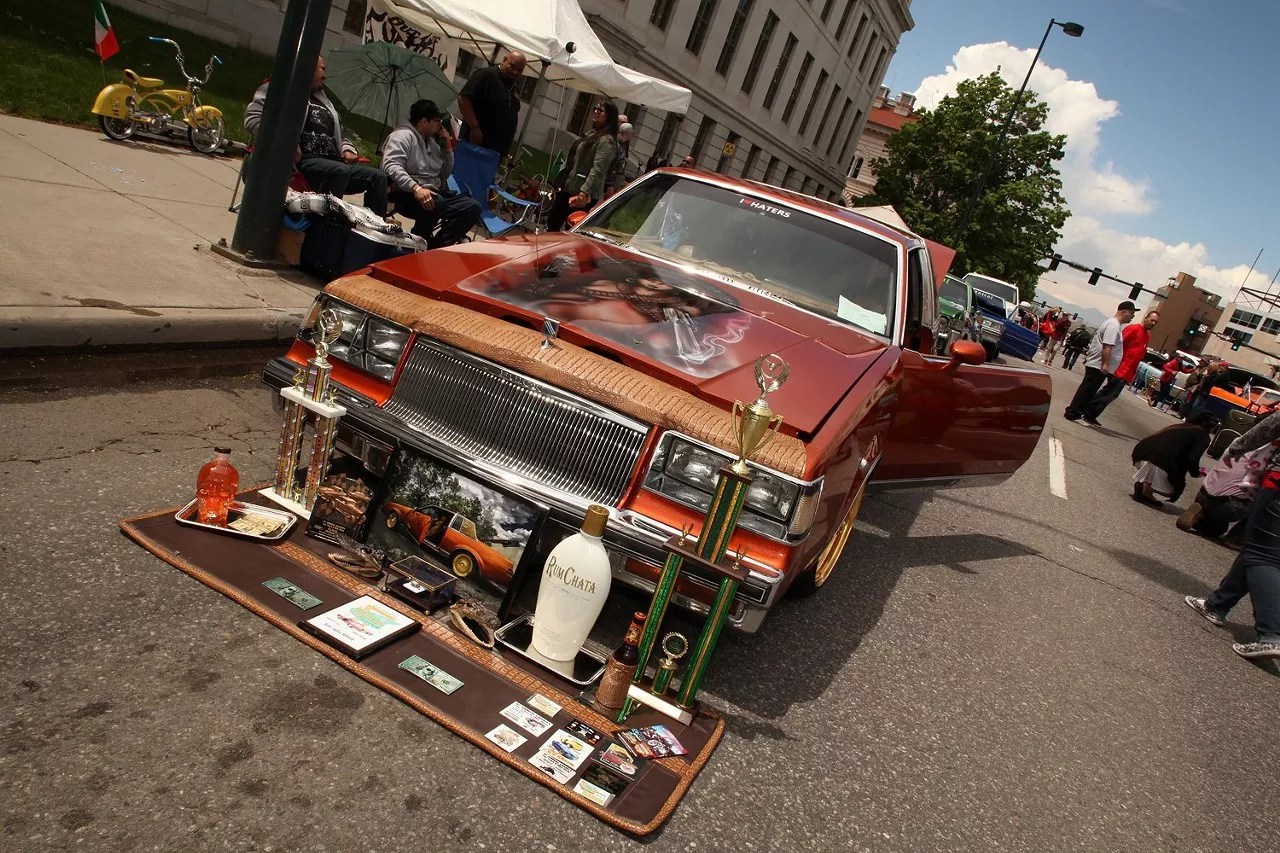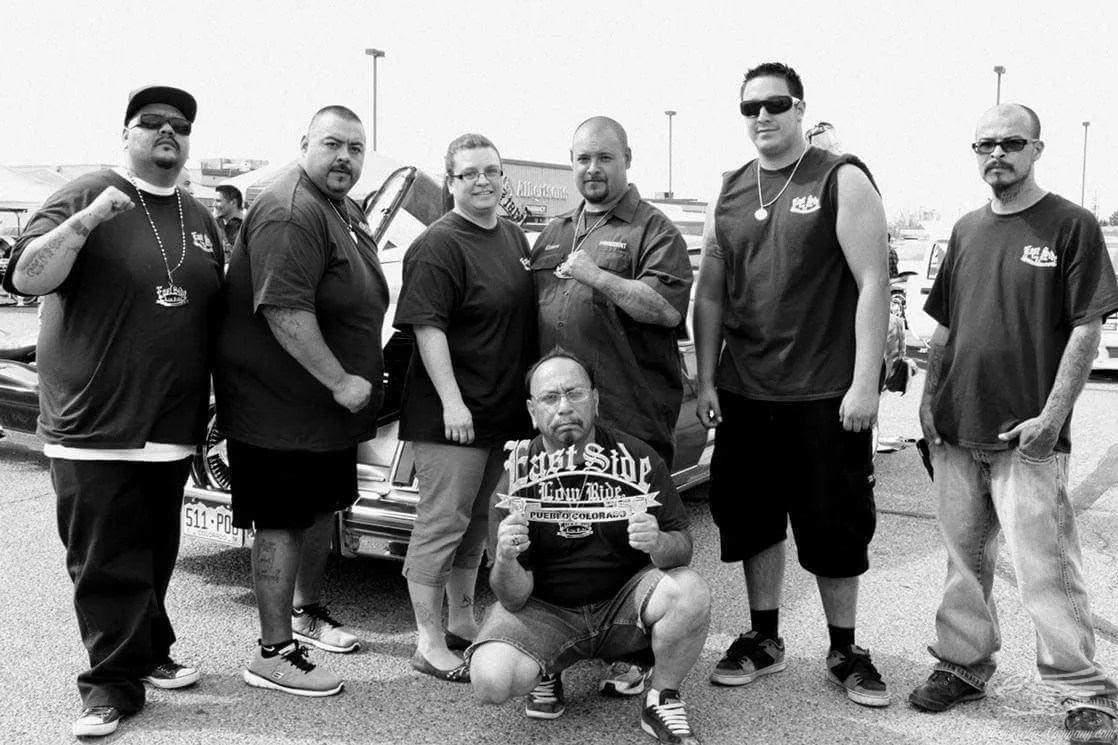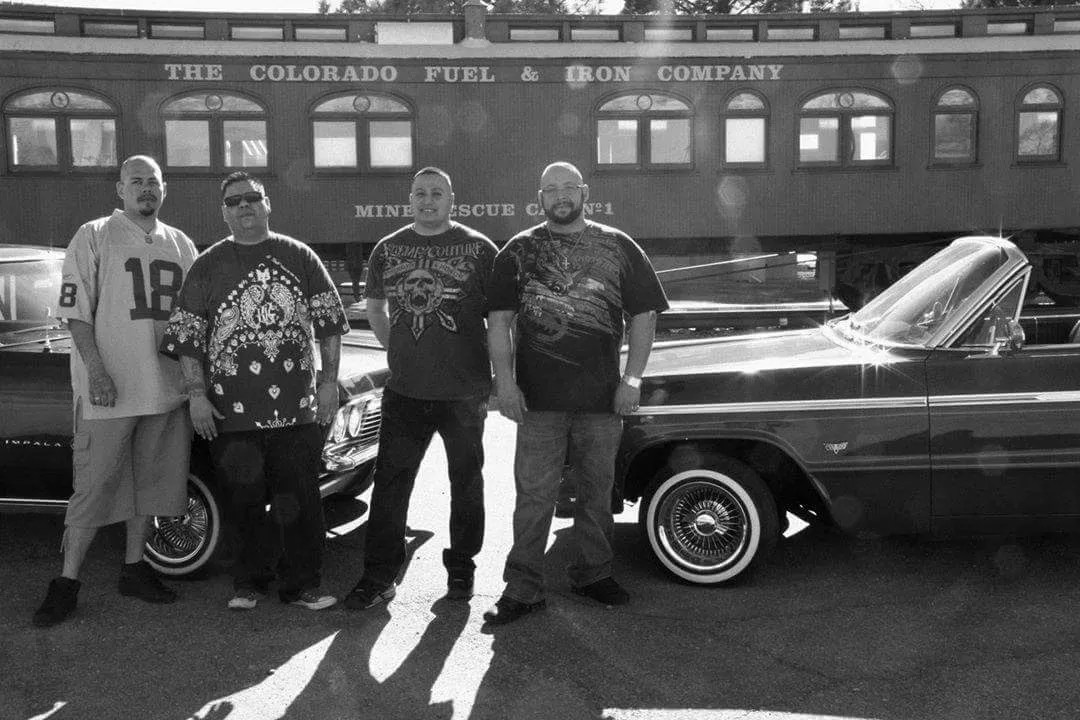
Aaron Thackeray

Audio By Carbonatix
Reddog Rudy’s grandmother gave him his first lowrider car, a 1969 Chevrolet Impala, when he was about to learn to drive at age fifteen. The car is a classic, made pop-culture famous in Snoop Dogg and Dr. Dre videos in the ’90s.
Rudy and his grandmother forged a bond over the Impala, as strong as the shocks that allow lowriders to bounce high during a hop contest. She told him she felt famous when he drove her around Denver, because the silver-flake-candy paint job he gave his lowrider “sparkled like the stars,” he recalls.
Now forty years old, Rudy is a Denver native living in Pueblo who has been a part of lowrider culture his entire life, participating in the Eastside LowRide Car Club, which was founded in 1979 in Pueblo, a few years after he was born. In that time, he’s helped shaped the local scene.
“Before that, I was banging and shit,” he says, and the car saved him from gang life. It was promised to him by his grandfather before he died. Rudy’s grandmother would only hand it over on two conditions: Rudy had to earn good grades and stay in school. So he did.
Lowriding with his friends in high school shaped Rudy’s view of Chicano culture; he learned to respect others and pledged a life of nonviolence, of pride in cars and community, and of feeling “rich for the day,” cruising around in a lowrider he spent hard-earned money and time on.

EastSide LowRide Car Club, founded in 1979 in Pueblo.
Junior Robinson
Rudy considers himself a Chicano with Pinoy roots; his grandfather is Filipino and came to Denver by way of California. Understanding relationships between different ethnic and racial groups and how bonds are formed and broken in the streets, Rudy points out that lowrider culture is more than just a Chicano thing. Lowriding Zoot Suiters were black, too. Filipinos grew up in neighborhoods alongside Chicanos, embracing elements of the culture around them. Music has always transcended racial lines, Rudy says. Take hip-hop, which is influenced by, and influences, Chicano culture.
All of these ethnic subcultures came under fire from the police in the ’80s and ’90s, Rudy says, and Mexican street culture, in particular, was criminalized under the auspices of stopping gang violence. He recalls when police presence in Denver’s Latino neighborhoods skyrocketed. Lowrider drivers were ticketed for cruising Federal Boulevard on Cinco de Mayo. He remembers cops accusing young Latinos of having gang affiliations just for driving a lowrider. Officers would impound cars after culturally motivated traffic stops. Some politicians attempted to ban cruising outright.
Rudy and his friends organized with Cop Watch, Barrio Warriors de Aztlan, Escuela Tlatelolco, and the American Indian Movement of Colorado to resist law enforcement’s efforts to target Latinos and other communities of color. He helped form a group called Families United for Safe Cruising, which began around ’96. Despite confronting and challenging law enforcement, Rudy says they eventually found a middle ground that allowed for cruising, as long as safety lanes were blocked off for emergency vehicles and off-limit areas were secured to help with traffic flow.

Eastside LowRide Car Club members and cars.
Junior Robinson
More than a decade after Families United for Safe Cruising formed, Denver police unveiled their own lowrider in 2012, the brainchild of Montbello High School’s senior class. It’s been used as a public-relations tool at community events ever since.
Organizing became a compass for Rudy’s life. He’s works as a gang-prevention and -intervention specialist and an activist. Rudy says he’s “currently known as Eastside Santa because the lowrider and biker communities come together every Christmas to delivery toys to kids.”
He recently returned from the Standing Rock protest against the Dakota Access Pipeline in Standing Rock, North Dakota. He stayed there through the winter, fighting alongside Chicano and indigenous people for the health of Native communities.
The lessons he learned advocating for lowrider culture and Chicano communities here in Colorado played a big part in his efforts at Standing Rock.
The Chicano community has often been demonized, scapegoated or attacked, made to feel ugly and unwelcome, Rudy says, but lowriding had the effect of helping the community feel beautiful and proud “without having to pay $20 for a ticket to some event” or having to participate in other communities’ events. They just had to park, dressed in their Chicano best, and stand next to their shined-up lowriders.
“We want to continue the preservation of our lowriding culture and pass it down to our next generations,” Rudy says. “Cruising our lowriders still stands in defiance of the mainstream. It holds true to our unique being and spirit – same as the feeling of an Aztec warrior in full regalia and headdress, standing magnificent in all the colors and details.”
This weekend, Lowrider Magazine‘s 2017 Lowrider Tour comes to town. Rudy plans to roll out to Denver with his friends in the EastSide LowRide Car Club and represent Chicano pride at the event at the National Western Complex. He expects the streets will be packed with car enthusiasts, community members of all ages, and the police. His hope is that the latter will be there to ensure the crowd’s safety and dish out as few tickets as possible.
Perhaps while he’s in town, he’ll stop by his old haunt, Federal Boulevard.
Says Rudy: “Like a crowd of warriors on their horses overlooking our Rocky Mountains, we cruise our lowriders down the boulevard with the same honor, respect, and homage for all to see.”
The Lowrider Tour will take place from 11 a.m. to 5 p.m. on Sunday, May 21, at the National Western Complex, 4655 Humboldt Street. Tickets, $30, are available here.